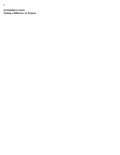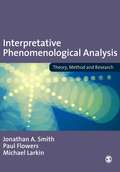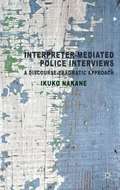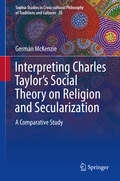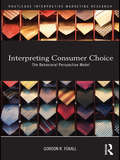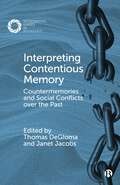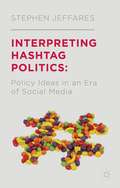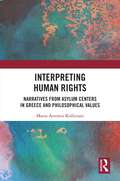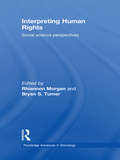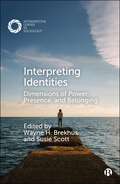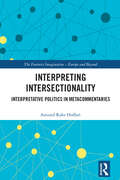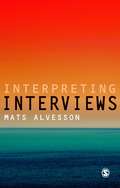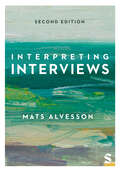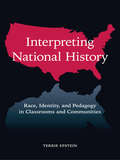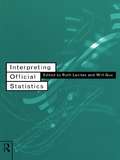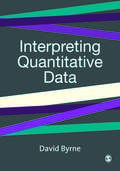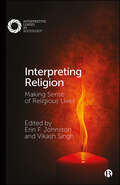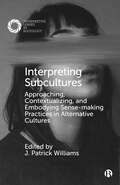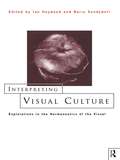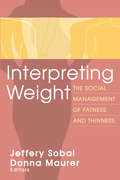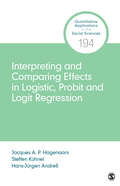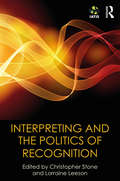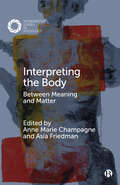- Table View
- List View
Interpretation: Making A Difference On Purpose
by Sam H. HamIn the new edition of the international bestseller Environmental Interpretation, Sam H. Ham captures what has changed in our understanding of interpretation during the past two decades. Ham draws on recent advances in communication research to unveil a fresh and invigorating perspective that will lead interpreters to new and insightful pathways for making a difference on purpose through their work.
Interpretative Phenomenological Analysis: Theory, Method and Research
by Jonathan A. Smith Paul Flowers Michael Larkin'It is not often I can use "accessible" and "phenomenology" in the same sentence, but reading the new book, Interpretative Phenomenological Analysis…certainly provides me the occasion to do so. I can say this because these authors provide an engaging and clear introduction to a relatively new analytical approach' - The Weekly Qualitative Report Interpretative phenomenological analysis (IPA) is an increasingly popular approach to qualitative inquiry. This handy text covers its theoretical foundations and provides a detailed guide to conducting IPA research. Extended worked examples from the authors' own studies in health, sexuality, psychological distress and identity illustrate the breadth and depth of IPA research. Each of the chapters also offers a guide to other good exemplars of IPA research in the designated area. The final section of the book considers how IPA connects with other contemporary qualitative approaches like discourse and narrative analysis and how it addresses issues to do with validity. The book is written in an accessible style and will be extremely useful to students and researchers in psychology and related disciplines in the health and social sciences.
Interpreter-mediated Police Interviews
by Ikuko NakaneThis book shows how the participation of interpreters as mediators changes the dynamics of police interviews, particularly with regard to power struggles and competing versions of events. Employing a range of approaches including conversation analysis, interactional sociolinguistics and legal narrative theory, Interpreter-mediated Police Interviews provides a detailed study of the impact of interpreter mediation on this area of the justice system. It reveals how turn-by-turn decisions of communication by all three participants, including the interpreter, affect the trajectory of the institutional discourse. By providing a better understanding of police interview discourse and exploring the practical implications of interpreter participation, this book contributes to the improvement of interpreter-mediated investigative interviews and will be of great interest to legal professionals as well as interpreters and their trainers.
Interpreting Charles Taylor’s Social Theory on Religion and Secularization
by Germán MckenzieThis book examines "Taylorean social theory," its sources, main characteristics and impact. Charles Taylor's meta-narrative of secularization in the West, prominently contained in his major work A Secular Age (2007), has brought new insight on the social and cultural factors that intervened in such process, the role of human agency, and particularly on the contemporary conditions of belief in North America and Europe. This study discusses what Taylor's approach has brought to the scholarly debate on Western secularization, which has been carried on mostly in sociological terms. McKenzie interprets Taylor's views in a way that offers an original social theory. Such interpretation is possible with the help of sociologist Margaret Archer's "morphogenetic theory" and by making the most of Taylor's particular understanding of the method of the social sciences and of his philosophical views on human beings, knowledge and modernity. After exploring the philosophical and sociological sources informing Taylorean social theory and proposing its basic concepts and hermeneutic guidelines, the author compares it with two widespread theories of secularization: the now waning "orthodox" account and that proposed by Rational Choice Theory scholars, particularly prevalent in the United States. In doing so, the book shows in which ways Taylorean social theory supersedes them, what new issues it brings into the scholarly discussion, and what difficulties might limit its future development.
Interpreting Consumer Choice: The Behavioural Perspective Model (Routledge Interpretive Marketing Research)
by Gordon FoxallInterpretive consumer research usually proceeds with a minimum of structure and preconceptions. This book presents a more structured approach than is usual, showing how a simple framework that embodies the rewards and costs associated with consumer choice can be used to interpret a wide range of consumer behaviours from everyday purchasing and saving, innovative choice, imitation, ‘green’ consumer behavior, to compulsive behaviors such as addictions (to shopping, to gambling, to alcohol and other drugs, etc). Foxall takes a qualitative approach to interpreting behavior, focusing on the epistemological problems that arise in such research and emphasizing the emotional as well as cognitive aspects of consumption. The author argues that consumer behaviour can be understood with the aid of a very simple model that proposes how the consequences of consumption impact consumers’ subsequent choices. The objective is to show that a basic model can be used to interpret consumer behaviour in general, not in isolation from the marketing influences that shape it, but as a course of human choice that is dynamically linked with managerial concerns.
Interpreting Contentious Memory: Countermemories and Social Conflicts over the Past
by Thomas DeGloma and Janet JacobsMemory is at the center of a diverse array of political conflicts, moral disputes, and power dynamics. This book illustrates how scholars use different interpretive lenses to study and explain profound conflicts rooted in the past. Addressing issues of racism, genocide, trauma, war, nationalism, colonial occupation, and more, it highlights how our interpretations of contentious memories are indispensable to our understandings of contemporary conflicts and identities. Featuring an international group of scholars, this book makes important contributions to social memory studies, but also shows how studying memory is vital to our understanding of enduring social problems that span the globe.
Interpreting Hashtag Politics
by Stephen JeffaresWhy do policy actors create branded policy ideas like Big Society and does launching them on Twitter extend or curtail their life? This book reveals how policy analysis can adapt in an increasingly mediatised to offer interpretive insights into the life and death of policy ideas in an era of hashtag politics.
Interpreting Human Rights: Narratives from Asylum Centers in Greece and Philosophical Values
by Maria-Artemis KolliniatiKolliniati’s groundbreaking book, Interpreting Human Rights: Narratives from Asylum Centers in Greece and Philosophical Values, challenges the notion that the interpretation and application of human rights primarily occur within the corridors of power in Strasbourg or official European institutions. It argues that such interpretation takes place in the grassroots settings of rural areas and neighborhoods, by actors who do not belong to the class of decision‑making elites.Focusing on the Aegean islands as exemplary sites of the European refugee crisis, this book draws on research conducted among local actors, including mayors, municipal councilors, representatives of NGOs and staff at refugee reception and identification centers. This book is divided into five distinctive sections: Methodology; Legal Framework and the Emergence of Hotspots; Empirical Research: Narratives of Local Actors; Local Narratives and Political Attitudes; and Glocalization of Human Rights. The study explores the role of human rights in narratives surrounding refugee flows, categorizing responses according to various political theory approaches such as global liberalism, egalitarianism, communitarianism and conservatism. By integrating applied political theory with localized human rights interpretations, this book offers actionable steps for addressing the challenges of migration in today’s interconnected world.By amplifying the voices of those directly engaged with one of contemporary Europe’s most significant challenges, Interpreting Human Rights will appeal to scholars of sociology, political theory, politics and international law, particularly those interested in migration, human rights and refugee studies.
Interpreting Human Rights: Social Science Perspectives (Routledge Advances in Sociology)
by Bryan S. Turner Rhiannon MorganIn recent decades, human rights have come to occupy an apparently unshakable position as a key and pervasive feature of contemporary global public culture. At the same time, human rights have become a central focus of research in the social sciences, embracing distinctive analytical and empirical agendas for the study of rights. This volume gathers together original social-scientific research on human rights, and in doing so situates them in an open intellectual terrain, thereby responding to the complexity and scope of meanings, practices, and institutions associated with such rights. Chapters in the book examine diverse theoretical perspectives and examine such issues as the right to health, indigenous peoples' rights, cultural politics, the role of the United Nations, women and violence, the role of corporations and labour law. Written by leading scholars in the field and from a range of disciplines across the social sciences, this volume combines new empirical research with both established and innovative social theory.
Interpreting Identities: Dimensions of Power, Presence, and Belonging (Interpretive Lenses in Sociology)
by Wayne H. Brekhus and Susie ScottThis edited collection brings together social scientists to interpret identity from a wide range of analytical perspectives. Drawing on multiple interpretive traditions from the last 100 years, the book explores how underlying social, cultural and psychological forces shape the dimensions of identity. Chapters emphasize how identity forms and functions in relation to key sociological issues such as social power, social control and the production and reproduction of social inequalities. Contributors also explore the flexibility of identities, showcasing how different perspectives and analytical tools reveal the nuances of rejected, unrealized and aspirational identities. By navigating these dimensions, the book reveals the interplay between personal biography and broader social life.
Interpreting Intersectionality: Interpretative Politics in Metacommentaries (The Feminist Imagination - Europe and Beyond)
by Amund Rake HoffartAgainst the backdrop of the emergence of intersectionality as a dominant paradigm in feminist scholarship and activism, this book explores the genre of metacommentaries as critical responses to the development of intersectionality as a paradigm. With attention to the dispersal of intersectionality into ever-newer contexts – and the missteps and breakdowns that occur during this process – it addresses the concern that intersectionality is transforming into something unrecognisable, drifting too far away from its foundational sources and visions and becoming diluted by its expansion. Examining the process by which metacommentaries engage in a form of corrective storytelling – seeking to rescue intersectionality from misuse by pinning it down and returning it to where it belongs – Interpreting Intersectionality presents a critique of these gestures of correction, arguing that, far from reconnecting intersectionality with its roots and enabling it to realise its potential, such metacommentaries actually bind the scholarly discourse on intersectionality to an either/or argumentative dynamic. It will therefore appeal to scholars and students with an interest in feminist theory, gender studies and/or intersectional analysis.
Interpreting Interviews
by Mats AlvessonResearchers conducting interviews in the social sciences quickly find that there is no single best way to approach their task. This text offers a critique of traditional interviewing practices and provides a framework for thinking about issues such as trustworthiness, identity and language in a conceptual rather than technical context, allowing you to develop your own reflexive practice. The research interview is in with the brick and mortar of qualitative research, and is one of the routine methods of obtaining knowledge of individuals, groups and organizations. Through the use of eight original metaphors drawing on trends in language, subject and discourse, this cutting-edge text will encourage you to question the interpretive nature and theoretical underpinnings not only of your interview method, but of the knowledge which is conveyed through it. This text is essential reading for postgraduate students of qualitative methods and researchers looking to more clearly conceptualise their interviewing practice and explore its theoretical basis.
Interpreting Interviews
by Mats AlvessonThrough the use of eight original metaphors for understanding what may happen in interviews and what may guide the interviewee (more than telling the truth or revealing experiences), the reader is encouraged to do interviews in clever ways. This text enables you to question the interpretive nature and theoretical underpinnings of the interview method, and of the knowledge which is conveyed through it. The updated second edition includes new content on: • How to avoid traps in interviews • How to use interviewees with experience and insight • How to work creatively with generative material • The value of repeat interviewing over time • The importance of supplementing interviews with other methods • Possibilities of interview-based research accompanied by examples This text is essential reading for upper undergraduate and postgraduate students of qualitative methods, and researchers looking to more clearly conceptualize their interviewing practice and explore its theoretical basis. Mats Alvesson is professor at University of Bath and is also affiliated with Lund University, Stockholm School of Economics and Bayes Business School.
Interpreting Interviews
by Mats AlvessonThrough the use of eight original metaphors for understanding what may happen in interviews and what may guide the interviewee (more than telling the truth or revealing experiences), the reader is encouraged to do interviews in clever ways. This text enables you to question the interpretive nature and theoretical underpinnings of the interview method, and of the knowledge which is conveyed through it. The updated second edition includes new content on: • How to avoid traps in interviews • How to use interviewees with experience and insight • How to work creatively with generative material • The value of repeat interviewing over time • The importance of supplementing interviews with other methods • Possibilities of interview-based research accompanied by examples This text is essential reading for upper undergraduate and postgraduate students of qualitative methods, and researchers looking to more clearly conceptualize their interviewing practice and explore its theoretical basis. Mats Alvesson is professor at University of Bath and is also affiliated with Lund University, Stockholm School of Economics and Bayes Business School.
Interpreting National History: Race, Identity, and Pedagogy in Classrooms and Communities (Teaching/Learning Social Justice)
by Terrie EpsteinHow do students’ racial identities work with and against teachers’ pedagogies to shape their understandings of history and contemporary society? Based on a long-term ethnographic study, Interpreting National History examines the startling differences in black and white students' interpretations of U.S. history in classroom and community settings. Interviews with children and teens compare and contrast the historical interpretations students bring with them to the classroom with those they leave with after a year of teacher's instruction. Firmly grounded in history and social studies education theory and practice, this powerful book: Illuminates how textbooks, pedagogies, and contemporary learning standards are often disconnected from students’ cultural identities Explores how students and parents interpret history and society in home and community settings Successfully analyzes examples of the challenges and possibilities facing teachers of history and social studies Provides alternative approaches for those who want to examine their own views toward teaching national history and aspire to engage in more culturally responsive pedagogy.
Interpreting Official Statistics
by Ruth Levitas Will GuyInterpreting Official Statistics examines the official statistics produced about the current state of British society. It documents some of the ways in which information has been suppressed, manipulated and misinterpreted since 1979. This invaluable guide is designed to help students know what figures are available, and to discover when and how politicians are misusing statistics.Data sets covered include:* Households below average income* Administrative and survey methods of unemployment and crime* Population census data on ethnicity* Data sources on women and work* Data on the relationship between class and health, and safety at work* New data sources on disability* Labour Force Survey.
Interpreting Quantitative Data
by David ByrneHow do quantitative methods help us to acquire knowledge of the real world? What are the `do's' and `don'ts' of effective quantitative research? This refreshing and accessible book provides students with a novel and useful resource for doing quantitative research. It offers students a guide on how to: interpret the complex reality of the social world; achieve effective measurement; understand the use of official statistics; use social surveys; understand probability and quantitative reasoning; interpret measurements; apply linear modelling; understand simulation and neural nets; and integrate quantitative and qualitative modelling in the research process. Jargon-free and written with the needs of students in mind, the book will be required reading for students interested in using quantitative research methods.
Interpreting Religion: Making Sense of Religious Lives (Interpretive Lenses in Sociology)
by Erin F. Johnston and Vikash SinghThis edited collection harnesses a diversity of interpretivist perspectives to provide a panoramic view of the production, experiences, contexts, and meanings of religion. Scholars from the US, South Asia and Europe explore religious phenomena using ethnographic, comparative historical, psychosocial, and critical theoretical approaches. Each chapter addresses foundational themes in the study of religion – from identity, discourse and power to ritual, emotion, and embodiment. Authors examine dynamic intersections of race, gender, history, and the present within the religious traditions of Christianity, Islam, Judaism and Buddhism, as well as among the non-religious. Cutting boldly across religious traditions and paradigms, the book investigates areas of harmony and contradiction across different interpretive lenses to achieve a richer understanding of the meanings of religion.
Interpreting Subcultures: Approaching, Contextualizing, and Embodying Sense-Making Practices in Alternative Cultures
by J. Patrick WilliamsThe concept of ’subculture’ is an invaluable tool to frame the study of non-normative and marginal cultures for social and cultural scholars. This international collection uncovers the significance of meaning-making in the processes of defining, studying and analyzing subcultural phenomena. Examining various dimensions of interpretivism, the book focuses on overarching concerns related to interpretation as well as day-to-day considerations that affect researchers’ and members’ interpretations of subcultural phenomena. It reveals how and why people use specific conceptual frames or methods and how those shape their interpretations of everyday realities. This is an unprecedented contribution to the field, explaining the interpretive processes through which people make sense of subcultural phenomena.
Interpreting Visual Culture: Explorations in the Hermeneutics of Vision
by Ian Heywood Barry SandywellInterpreting Visual Culture brings together original writings from leading experts in art history, philosophy, sociology and cultural studies. Ranging from an analysis of the role of vision in current critical discourse to discussion of specific examples taken from the visual arts, ethics and sociology, it presents the latest material on the interpretation of the visual in modern culture.Among topics covered are:* the visual rhetoric of modernity* the drawings of Bonnard* recent feminist art* practices and perception in arts and ethics.
Interpreting Weight: The Social Management of Fatness and Thinness (Social Problems And Social Issues Ser.)
by Jeffery SobalWhat is "too fat"? what is "too thin"? Interpretations of body weight vary widely across and within cultures. Meeting weight expectations is a major concern for many people because failing to do so may incur dire social consequences, such as difficulty in finding a romantic partner or even in locating adequate employment. without these social and cultural pressures, body weight would only be a health issue. while socially constructed standards of body weight may seem immutable, they are continuously recreated through social interactions that perpetuate or transform expectations about fatness and thinness. Written by sociologists, psychologists, and nutritionists, all of the chapters in this book focus on how people construct fatness and thinness, examining different strategies used to interpret body weight, such as negotiating weight identities, reinterpreting weight, and becoming involved in weight-related organizations. Together these chapters emphasize the many ways that people actively define, construct, and enact their fatness and thinness in a variety of settings and situations.
Interpreting and Comparing Effects in Logistic, Probit, and Logit Regression (Quantitative Applications in the Social Sciences)
by Jacques A. Hagenaars Steffen Kuhnel Hans-Jurgen AndressLog-linear, logit and logistic regression models are the most common ways of analyzing data when (at least) the dependent variable is categorical. This volume shows how to compare coefficient estimates from regression models for categorical dependent variables in three typical research situations: (i) within one equation, (ii) between identical equations estimated in different subgroups, and (iii) between nested equations. Each of these three kinds of comparisons brings along its own particular form of comparison problems. Further, in all three areas, the precise nature of comparison problems in logistic regression depends on how the logistic regression model is looked at and how the effects of the independent variables are computed. This volume presents a practical, unified treatment of these problems, and considers the advantages and disadvantages of each approach, and when to use them, so that applied researchers can make the best choice related to their research problem. The techniques are illustrated with data from simulation experiments and from publicly available surveys. The datasets, along with Stata syntax, are available on a companion website.
Interpreting and Comparing Effects in Logistic, Probit, and Logit Regression (Quantitative Applications in the Social Sciences)
by Jacques A. Hagenaars Steffen Kuhnel Hans-Jurgen AndressLog-linear, logit and logistic regression models are the most common ways of analyzing data when (at least) the dependent variable is categorical. This volume shows how to compare coefficient estimates from regression models for categorical dependent variables in three typical research situations: (i) within one equation, (ii) between identical equations estimated in different subgroups, and (iii) between nested equations. Each of these three kinds of comparisons brings along its own particular form of comparison problems. Further, in all three areas, the precise nature of comparison problems in logistic regression depends on how the logistic regression model is looked at and how the effects of the independent variables are computed. This volume presents a practical, unified treatment of these problems, and considers the advantages and disadvantages of each approach, and when to use them, so that applied researchers can make the best choice related to their research problem. The techniques are illustrated with data from simulation experiments and from publicly available surveys. The datasets, along with Stata syntax, are available on a companion website.
Interpreting and the Politics of Recognition: The IATIS Yearbook (The IATIS Yearbook)
by Christopher Stone Lorraine LeesonInterpreting and the Politics of Recognition investigates the historical, ethical and professional dimensions of this, arguably, most widespread form of intercultural communication. Covering key topics from colonialism to representation, ethics and power, it looks at the different linguistic modalities (signed and spoken) used within communities to investigate equality of citizens. The contributors include leading authorities in their fields and use a wide spread of examples from a variety of disparate cultures – including deaf and ethnic minority groups. With eight chapters presented in three thematic sections and a foreword by Michael Cronin setting the book in its wider context, this volume will be of interest to practising interpreters, researchers and advanced students in the areas of Interpreting Studies, Translation Studies, and Linguistics and Communication Studies. Additional resources for Translation and Interpreting Studies are available on the Routledge Translation Studies Portal: http://cw.routledge.com/textbooks/translationstudies.
Interpreting the Body: Between Meaning and Matter
by Anne Marie ChampagneWritten by leading social scientists working in and across a variety of analytic traditions, this ambitious, insightful volume explores interpretation as a focal metaphor for understanding the body’s influence, meaning, and matter in society. Interpreting body and embodiment in social movements, health and medicine, race, sex and gender, globalization, colonialism, education, and other contexts, the book’s chapters call into question taken-for-granted ideas of where the self, the social world, and the body begin and end. Encouraging reflection and opening new perspectives on theories of the body that cut through the classic mind/body divide, this is an important contribution to the literature on the body.
